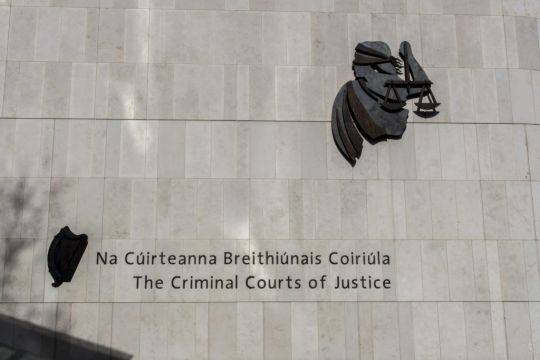A man convicted of murdering his former partner by stabbing her 19 times in a darkened archway in front of their child was provoked by his victim's decision not to allow him see the child that day, his lawyers have told the Court of Appeal.
In May 2021, a Central Criminal Court jury found Edmundas Dauksa guilty of murdering his former partner, whom he stabbed in front of their six-year-old daughter days after the child was placed into the sole custody of her mother by a court.
The 12 jurors rejected Dauksa's defence that he had not been "fuelled with murderous intent" when he carried out the attack on the mother-of-two in Louth five years ago.
Dauksa (53), with an address at Castletown Road in Dundalk, Co Louth, had pleaded not guilty to murder but guilty to the manslaughter of Ingrida Maciokaite (31) at Bridgewater Mews, Linenhall Street, Dundalk, on September 18th, 2018.
His defence had said that the Lithuanian national became "a broken man" when his daughter was "taken" from him but an arrangement was made that Ms Maciokaite would bring the child to the accused's house on September 18th.
However, the deceased decided not to bring the child to the house, which upset the accused and he went to talk to his former partner in the courtyard of her home that afternoon before murdering her with a knife taken from his own home.
It was also the defence contention that the accused had felt "wronged and wronged again" by a system which had "failed him appallingly", after the deceased had received custody of the child in an "abnormal and accelerated" District Court hearing days before the killing.
At the Court of Appeal today, John D Fitzgerald SC, for Dauksa, said the "volte face" of Ms Maciokaite, who decided not to bring their child to Dauksa's home as promised, had amounted to provocation. Counsel argued that this defence should have been allowed to go before a jury but was blocked by trial judge Mr Justice Paul McDermott.
Mr Fitzgerald said that his client had spent the weekend taking sedatives and drinking to cope with the loss of the custody of the child who had lived with Dauksa and his wife for years.
Counsel said the District Court matter handing sole access to Ms Maciokaite led to his client being "very distraught" and "destroyed as a human being".
Mr Fitzgerald said that his client had "sent messages to the deceased that his daughter had been ripped from him by someone who had not previously shown interest".
On the day of the murder, Dauksa's wife said that at around 2pm Maciokaite had rang saying she was no longer going to call over with their daughter which was a "provoking event" for Dauksa.
Mr Fitzgerald said that the phone call was "the trigger" and that in law it could reasonably amount to provocation, considering the background to the case, even though it was not "a classic case of provocation in a face-to-face manner".
Mr Justice John Edwards said that Dauksa had been in a "self-induced state of intoxication". "You can't create a situation to lose self control and then point to the loss of self control as an excuse," said Mr Justice Edwards.
"The judge has a role, he must engage with the evidence and in this instance he was confronted with a parent who was deeply hurt, disappointed and angry and hostile towards the deceased. He [Dauksa] armed himself with a knife and left the house. It doesn't necessarily follow that such an action gives rise to provocation just because it occurred," said Mr Justice Patrick McCarthy.
Ms Justice Úna Ní Raifeartaigh said the court was still left with the question of proportionality in Dauksa picking up a knife in response to being told about the phone call.
Mr Justice McCarthy said: "You are saying those bare facts are sufficient enough to go to the jury. That is a threshold so low that I find it hard to be sufficient. To me, that bar is as low as it gets, to be blunt."
Conor Devally SC, for the State, said a provocation defence requires an evidential basis to be put before a jury and that the judge's role was to decide on the strength of that evidence.
Mr Devally said that the alleged provocation were actions "other than those of the deceased".
Mr Devally said the deceased had been "extremely surprised" by the events of the District Court in granting her sole custody but that even then she relented to some degree in agreeing for Dauksa to be allowed to see their daughter despite a court order being in place.
"Is it an act of provocation that she cannot do something because of the court order?" asked Mr Devally.
"Was there a total loss of control," asked Mr Devally who said CCTV showed the accused and deceased talking and walking freely towards the archway for a number of minutes before entering it. "Is it the case then that the entire conversation is somehow under the white heat of passion?" said Mr Devally, who noted that the knife was not visible in Dauksa's hand on CCTV.
Mr Justice John Edwards said the court would reserve judgement in the matter.







